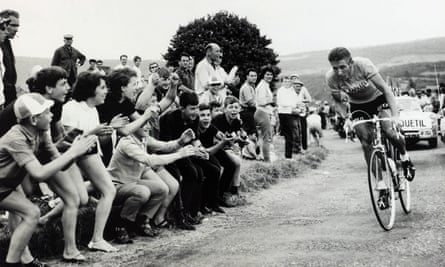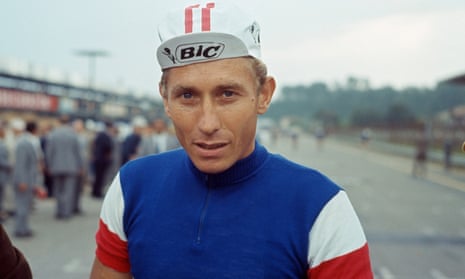No one ever looked as good on a bicycle as Jacques Anquetil. The first man to win the Tour de France five times – in 1957 and from 1961 to 1964 – seemed to have been manufactured in the same factory as the machines he rode, every ounce of superfluous weight pared away, streamlined to perfection and running on frictionless bearings. Frozen in motion by the still camera, he revealed an aesthetic perfection that would have brought a light to any sculptor’s eye.
On the first page of his slender memoir of devotion, Paul Fournel captures his subject’s essence: “Anquetil pedalled blond, with supple ankles; he pedalled on points, back bent, arms at right angles, head straining forwards … He was made to be seen alone on the road, silhouetted against the blue sky; nothing about him suggested the peloton, the crowd and the strength of being united. He was cycling beauty out on its own.”
He was also unloved by a large percentage of his own public. Grudgingly, they admired his pale, ultra-modern efficiency and contemporary sense of style, but they gave their hearts to Raymond Poulidor, the representative of a more bucolic France, whose failure to conquer Anquetil year after year gave him a nickname – the Eternal Second – that would, in other circumstances, have seemed unenviable. Anquetil’s nicknames were Maître Jacques and Monsieur Chrono: the first reflected his seeming invincibility, the second his specific mastery of the time trial, the race in which the rider pedals alone and the enemy is the stopwatch.
The first great achievement of his career, when he was 22 and doing his year’s military service in the army, was to break Fausto Coppi’s longstanding record for the distance covered in one hour on the banked boards of a velodrome. He appeared bloodless and calculating.
Fournel tells the story of a time trial in Switzerland that Anquetil won six times in a row. The organisers, fearing the stifling effect of a seventh victory, offered to pay him not to turn up. He accepted the deal. A few months later, thinking of their advance ticket sales, they thought better of it and offered him another fee, plus a third fee on top if he allowed someone else to win. He asked to be paid up front. Before the start of the race he approached the Italian champion Ercole Baldini, the best of his rivals, with a proposition: if you give me your fee, Anquetil said, I’ll let you win. Baldini gratefully accepted the offer, and paid up. But the story was not over. “As the weather was fine, the route beautiful and the prize money substantial,” Fournel writes, “he won anyway. And Baldini understood that perfectly, because he knows how champions function.”
Anquetil, the acknowledged patron of the peloton, exploited its unique protocols with expert subtlety. He gave his winning bonuses to his team mates, granting them the occasional victory in order to secure the loyalty of the men who would work for him on the most gruelling days of a three-week stage race. Fournel: “When Anquetil gives, it is because he has received, or he is counting on receiving, something in return.” Anquetil: “I told my team mates that Johnny Hallyday pays his orchestra and they play for him. My team mates are my musicians.”

In an era when all the top professionals doped, Anquetil (below) believed it would be hypocritical to pretend otherwise. “You can’t ride the Tour de France on mineral water,” he said. In 1966, towards the end of his career, when dope tests were just being introduced, he was deprived of what would have been his only victory in Liège-Bastogne-Liège, one of the great classics, when he refused to give the required urine sample – as did the riders who finished second and third. At the time, it seemed like an affront to their metier. “We are men, not horses,” he said.
He used his winnings to buy big American cars and a grand house in his native Normandy. Sponsors proudly exploited his image in their advertisements. But, paradoxically, it was he who turned out to be the bucolic one. At the Château des Elfes he looked after his farm, raised cattle, tended crops, drove his beloved tractor. Nor, to say the least, was his life lacking in emotion. His wife, the glamorous blond Janine, brought a son and a daughter, Alain and Annie, from her previous marriage. Some years later, when she had proved unable to have further children, Anquetil fathered a daughter with the 18-year-old Annie, at her mother’s suggestion and with her cheerful consent. Jacques would later have another child, this time with Alain’s wife. Despite the occasional outbreak of jealousy, he remained the nexus of the family’s affections.
He retired in 1969. “The bike isn’t and never has been my greatest concern,” he had said. “I really think that I don’t, have never, and will never love the bike.” Nevertheless he would leave his farm to manage the French team and became a perceptive commentator on the Tour de France for television, radio and sports newspaper L’Équipe before his death from stomach cancer in 1987, aged 53.
Fournel is a student of Raymond Queneau, a leading light of the Oulipo literary workshop and a prize-winner in 1989 for Les Athlètes dans Leurs Tête. Unlike two previous English-language biographies – Richard Yates’s Master Jacques (2001) and Paul Howard’s excruciatingly titled Sex, Lies and Handlebar Tape (2008) – the elegantly produced Anquetil, Alone makes no claim to a detailed career analysis. Instead it offers a loving evocation not just of its protagonist but of the author’s own childhood infatuation.
Despite a handful of unimportant errors – the French firm Pivo made handlebar stems, not crossbars, and Vin, not Victor, Denson was Anquetil’s English team-mate – Fournel leaves no doubt that he understands the complexity of his subject. With this little masterpiece, the coolest and most enigmatic of champions is given the biography he deserves.
